In recent years, the market has been crowded with enterprise commerce platforms that promise scalability and world-class performance. And yet, many of them simply aren't built for real-world complexity. Far too often, companies realize that only after they've invested millions and months into the wrong solution!
So, how can you tell which platform is truly capable? Keep reading to uncover the 10 best solutions for your ambitious goals, including:
- Shopify Plus
- BigCommerce Enterprise
- Adobe Commerce (Magento)
- Clarity eCommerce Framework (CEF)
- Salesforce Commerce Cloud
- Oracle CX Commerce (Oracle Commerce Cloud)
- SAP Hybris Commerce (SAP Commerce Cloud)
- IBM WebSphere Commerce (now HCL Commerce)
- Sitecore Experience Cloud (with Sitecore OrderCloud)
- WooCommerce
Let us help you find the best enterprise commerce platform!
What Is Enterprise Commerce?
Enterprise commerce refers to digital commerce platforms and strategies designed specifically for large, complex businesses with high transaction volumes, global operations, and often multi-channel or multi-brand needs.
Unlike standard eCommerce solutions, enterprise commerce platforms offer advanced features like deep system integrations (ERP, CRM), complex customer segmentation, robust security, headless architecture options, etc. Achieving this level of customization and automation often requires experienced technology partners such as DashDevs, especially for complex enterprise-grade implementations. These platforms support both B2B and B2C models; plus, they prioritize customization, automation, and operational efficiency at scale.
10 Best Platforms for Enterprise Commerce
1. Shopify Plus
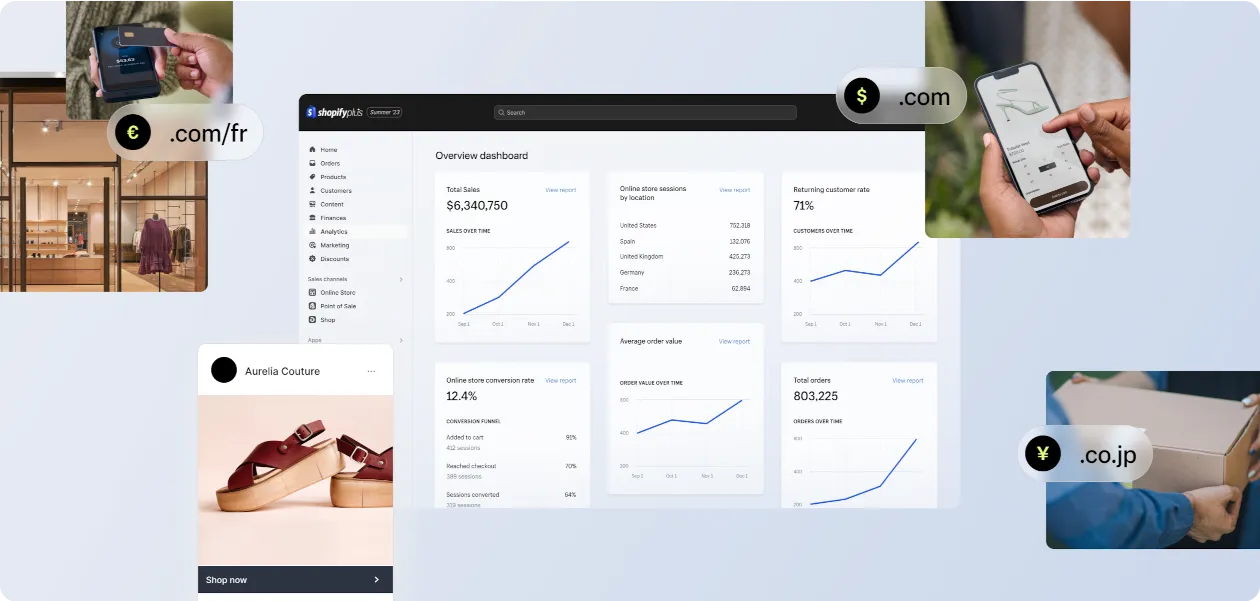
As the best enterprise commerce platform, Shopify Plus is uniquely built for fast-scaling direct-to-consumer (DTC) brands and high-volume merchants who prioritize time-to-market simplicity. This platform enables enterprise-grade automation and global expansion without the usual technical overhead of traditional platforms.
Enterprise commerce features:
- Shopify Flow, a visual automation tool for complex workflows without coding
- Launchpad that schedules and automates sales campaigns, product releases, and content updates
- Unlimited staff accounts and granular permission control
- Exclusive access to Shopify's robust APIs for custom integrations
- Headless commerce support with Hydrogen and Oxygen
- Built-in B2B capabilities like company profiles, custom catalogs, and net payment terms
- Dedicated Account Manager and 24/7 Priority Support
- Global selling tools: multi-currency, multi-language, and localized storefronts
- Checkout extensibility and customization via Shopify Functions
Shopify Plus $2,300+ per month (3-year term) | Pros | Cons |
+ Vast ecosystem of apps and technology partners + High-speed checkout performance (Shopify Checkout is optimized for speed) + Strong focus on security and PCI compliance built in + Frequent platform updates and innovation (e.g., AI-powered tools) | + Customization at extreme levels (beyond what apps can handle) may require heavy workarounds + Transaction fees unless using Shopify Payments + Some B2B features are newer and still evolving compared to legacy B2B platforms |
Best for:
Fast-scaling DTC brands, lifestyle and fashion companies, celebrity-backed product launches, and high-volume retail startups that want quick global expansion with minimal technical overhead.
Read more: Shopify Plus review
2. BigCommerce Enterprise
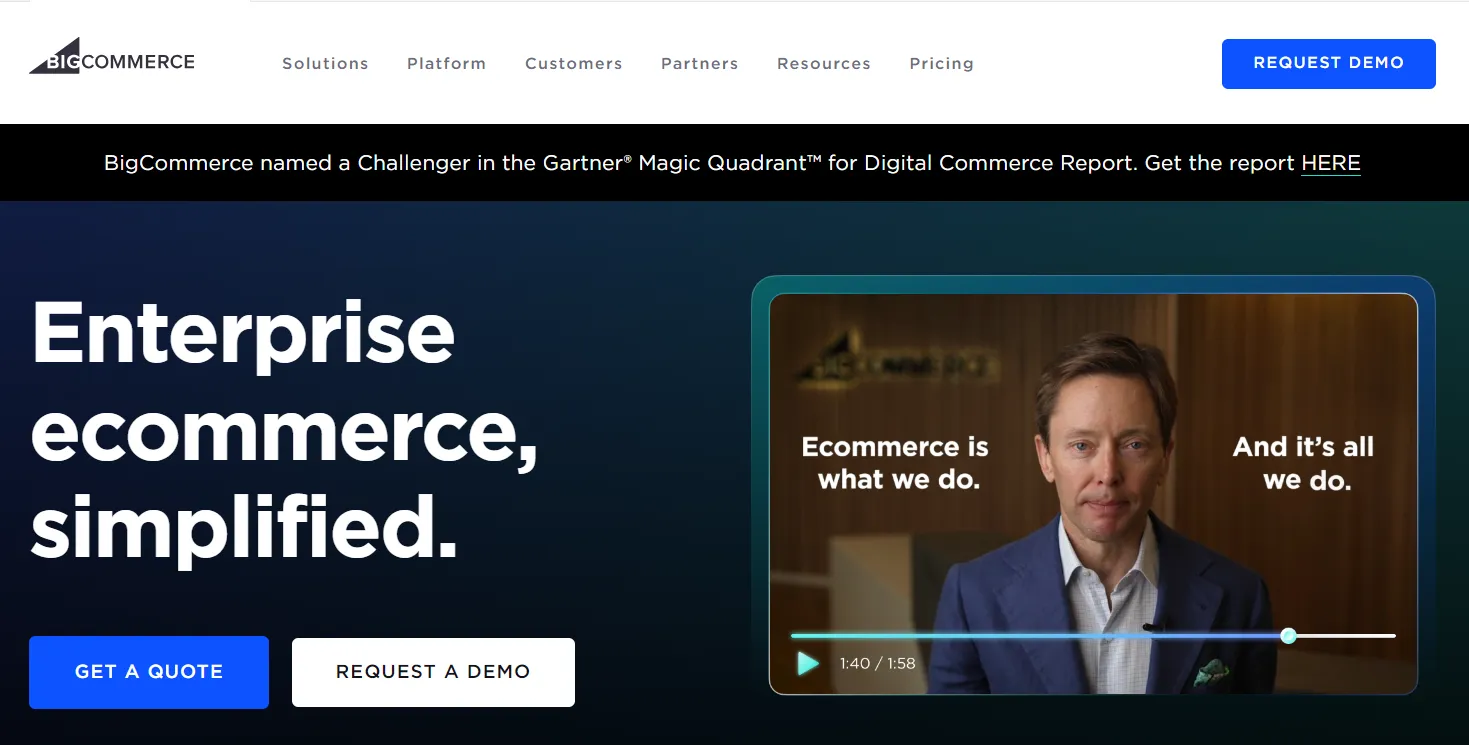
BigCommerce Enterprise offers “Open SaaS,” which combines the flexibility of open-source platforms with the low maintenance benefits of SaaS. It is considered the best enterprise commerce platform among businesses that need API-driven customizations and freedom over payment providers without being locked into proprietary systems.
Enterprise commerce features:
- Open API architecture with over 90% platform coverage
- Multi-storefront management from a single dashboard
- Native B2B features: price lists, customer groups, quote management, and purchase orders
- Advanced SEO tools like customizable URLs, microdata, and automatic redirects
- Headless commerce capabilities with ready integrations for WordPress, Next.js, and more
- Multi-currency and multi-language capabilities
- Server-to-server API performance for high-volume businesses
- No proprietary payment gateway (freedom to choose payment providers without penalties)
Big Commerce Enterprise Custom pricing | Pros | Cons |
+ Highly customizable without sacrificing SaaS stability + Native B2B functionality without heavy reliance on third-party apps + No transaction fees across any payment providers + Strong SEO capabilities out of the box + Seamless multi-storefront support built natively | + Themes and design customization can be more limited compared to Shopify + Some core B2B functionalities require additional setup or paid apps for advanced workflows + Complex catalog structures (like very large SKU counts) may need optimization for performance + Smaller third-party app ecosystem compared to Shopify |
Best for:
Mid-market manufacturers, wholesalers, and tech companies needing powerful B2B tools and high customization without managing servers or being locked into one payment processor.
Want to Migrate to BigCommerce?
LitExtension provides a well-optimized All-in-One migration service for you.
FREE DEMO NOW

3. Adobe Commerce (Magento)
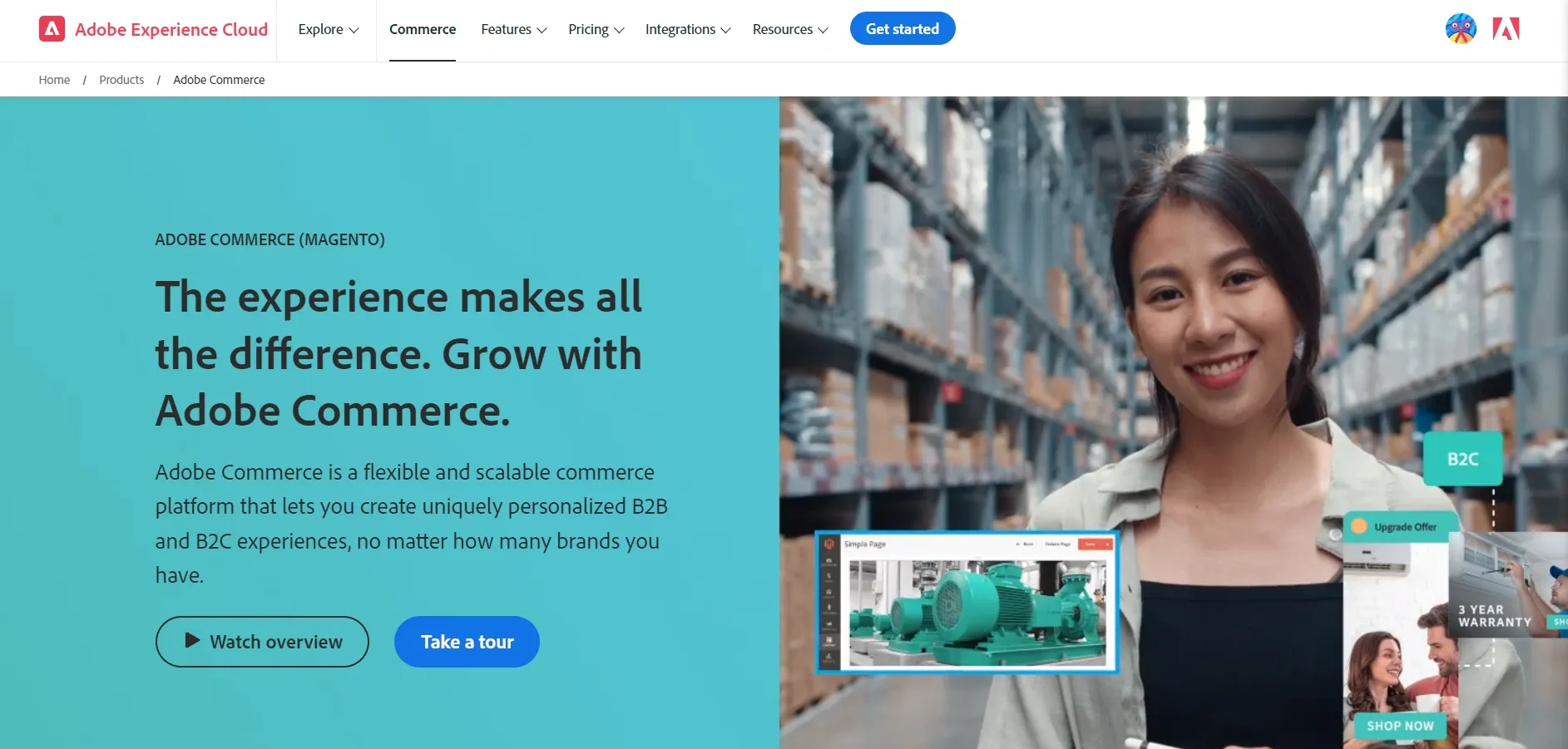
Since its release, Adobe Commerce (Magento) has been globally recognized as the best enterprise commerce platform for its unparalleled control over the storefront experience. Its complex, custom commerce ecosystems cater to brands that need massive catalog support and total ownership of their tech stack through open-source flexibility.
Enterprise commerce features:
- Full ownership of code with open-source flexibility
- Native B2B suite: custom catalogs, negotiated pricing, quick orders, requisition lists
- Powerful multi-store, multi-language, and multi-currency support
- Advanced content staging and preview tools
- AI-driven product recommendations and personalization via Adobe Sensei
- Powerful promotions and a rule-based pricing engine
- Deep integration with Adobe Experience Cloud for advanced marketing and analytics
- Robust APIs and GraphQL support for headless and PWA implementations
Adobe Commerce Custom pricing | Pros | Cons |
+ Ultimate control and customization possibilities + Strong B2B and D2C capabilities natively + Scalable to handle very complex catalogs and global businesses + Seamless integration with Adobe's suite (Marketo, Experience Manager, Analytics) + Strong community support and 4000+ extensions | + High total cost of ownership (licensing, hosting, development) + Requires significant technical expertise to manage and optimize + Slower time-to-market compared to SaaS platforms + Resource-heavy upgrades and maintenance if self-hosted |
Best for:
Large-scale enterprises with complex, multi-national operations (especially in B2B and hybrid B2B2C models), companies with massive catalogs, and businesses that demand full control over their platform.
Read more: Magento 2 review
4. Clarity eCommerce Framework (CEF)
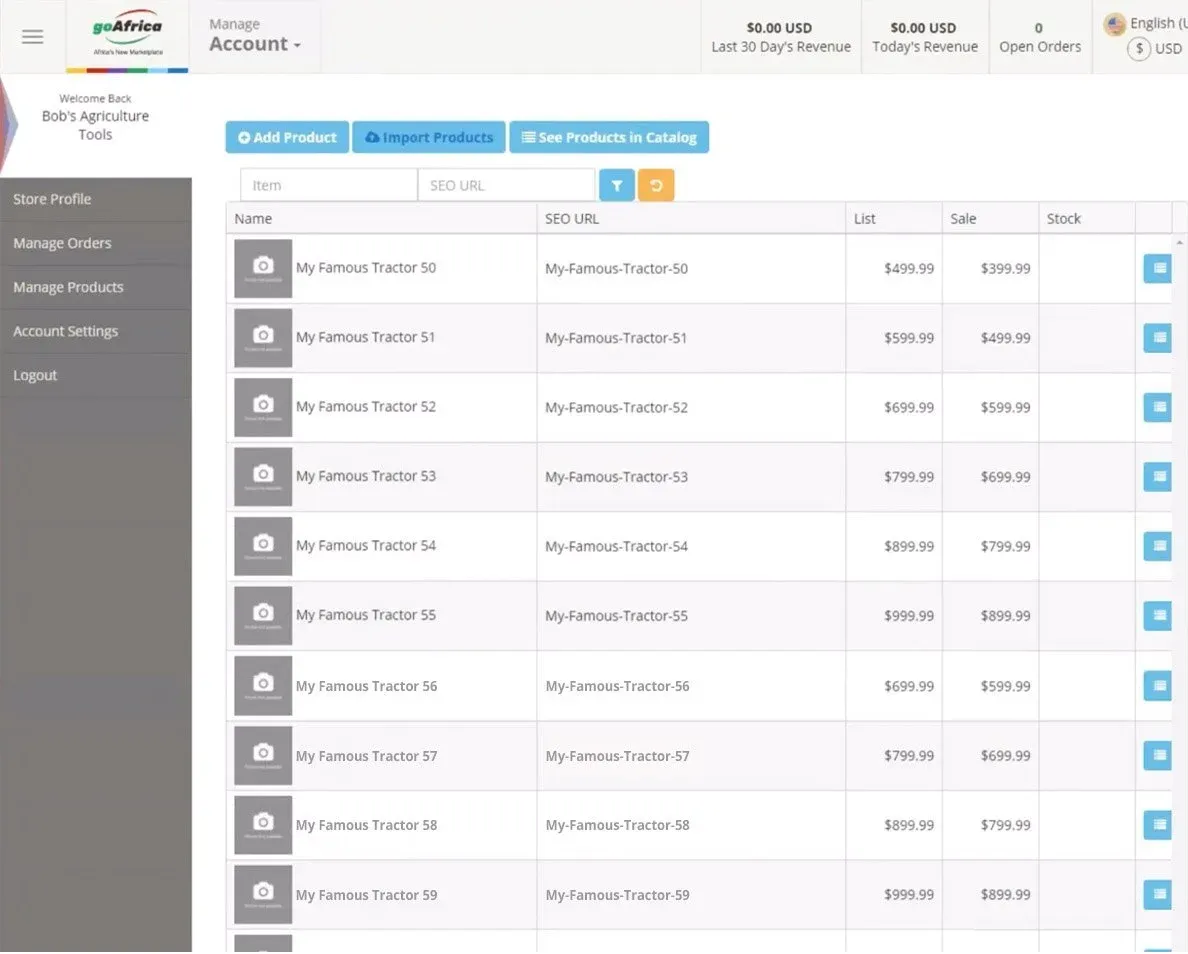
Clarity eCommerce Framework (CEF) is purpose-built for businesses with highly specialized operational needs, particularly in regulated industries like healthcare, manufacturing, and distribution. Unlike mainstream eCommerce platforms, Furthermore, it focuses heavily on ERP, CRM, and complex workflow integrations that are typically too complicated for standard solutions. For that reason, many label it the best enterprise commerce platform.
Enterprise commerce features:
- Highly customizable workflow engine for complex pricing, quoting, and ordering
- Deep ERP and CRM integration capabilities out of the box
- Multi-portal support for different brands, divisions, or client types
- Advanced quote-to-cash capabilities
B2B account management features: buyer roles, contract-based pricing, approval workflows - Secure portals for HIPAA, PCI compliance needs
- Flexible APIs for integrating any business system
- Multi-site and multi-tenant architecture
Clarity eCommerce Framework + Monthly SaaS: $599 + One-time pay: $15,000 | Pros | Cons |
+ Ideal for businesses with complex operational or regulatory needs + Strong ERP/CRM/EDI integration without heavy middleware + Full control over business rules and workflows + Customizable down to granular business processes + Specialized support for industries like healthcare and manufacturing | + Steep learning curve; highly technical setup and maintenance + Development-intensive for initial implementation and future scaling + Limited brand recognition compared to larger players like Shopify or Adobe + Smaller community and fewer pre-built third-party extensions |
Best for:
Healthcare suppliers, industrial manufacturers, government contractors, and any business with strict compliance requirements and heavy backend system integrations.
5. Salesforce Commerce Cloud
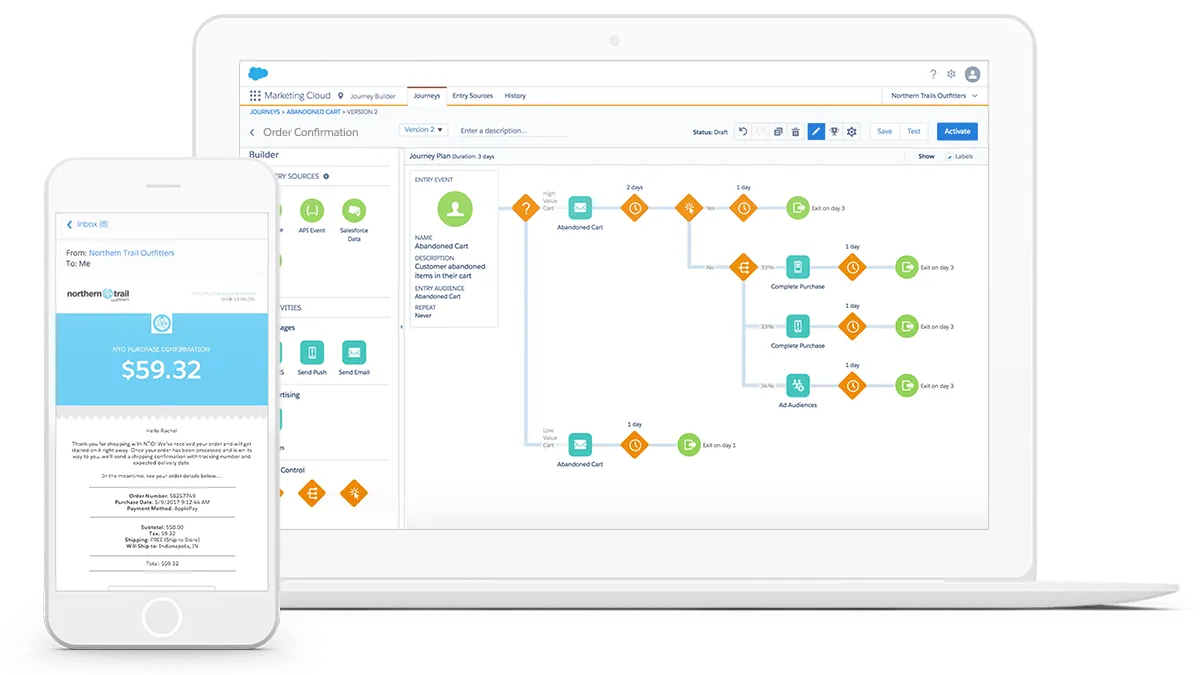
Salesforce Commerce Cloud is uniquely positioned as the best enterprise commerce platform deeply intertwined with the broader Salesforce ecosystem, offering a unified, 360-degree view of customer interactions. It promises to deliver AI-powered, highly personalized shopping experiences across multiple channels from a single source of truth.
Enterprise commerce features:
- AI-powered personalization with Salesforce Einstein
- Seamless omni-channel support (POS, mobile, social, online)
- Full native integration with Salesforce CRM, Marketing Cloud, and Service Cloud
- B2B2C support for manufacturers and distributors selling directly and via partners
- Global storefront management: multi-language, multi-currency, and regionalized experiences
- Headless commerce APIs and Commerce SDKs
- Order Management System (OMS) integration
- Powerful promotions engine with dynamic rule creation
Salesforce Commerce Cloud Growth: 1% GMV Advanced: 2% GMV B2C Premium: Custom | Pros | Cons |
+ Deep customer data integration for highly personalized commerce + Strong omnichannel selling capabilities + Built-in AI tools for merchandising and product recommendations + Unified view of customer data across commerce, marketing, and service + Trusted cloud infrastructure with high scalability | + Very high total cost of ownership (especially for smaller enterprises) + Less flexibility for extreme backend customization compared to open-source platforms + Time-consuming onboarding and implementation process + Heavy reliance on the Salesforce ecosystem (lock-in risk) |
Best for:
Large global brands in fashion, beauty, consumer goods, and luxury retail seeking full omnichannel experiences, deep CRM integration, and AI-driven customer journeys.
Read more: Salesforce review
6. Oracle CX Commerce (Oracle Commerce Cloud)
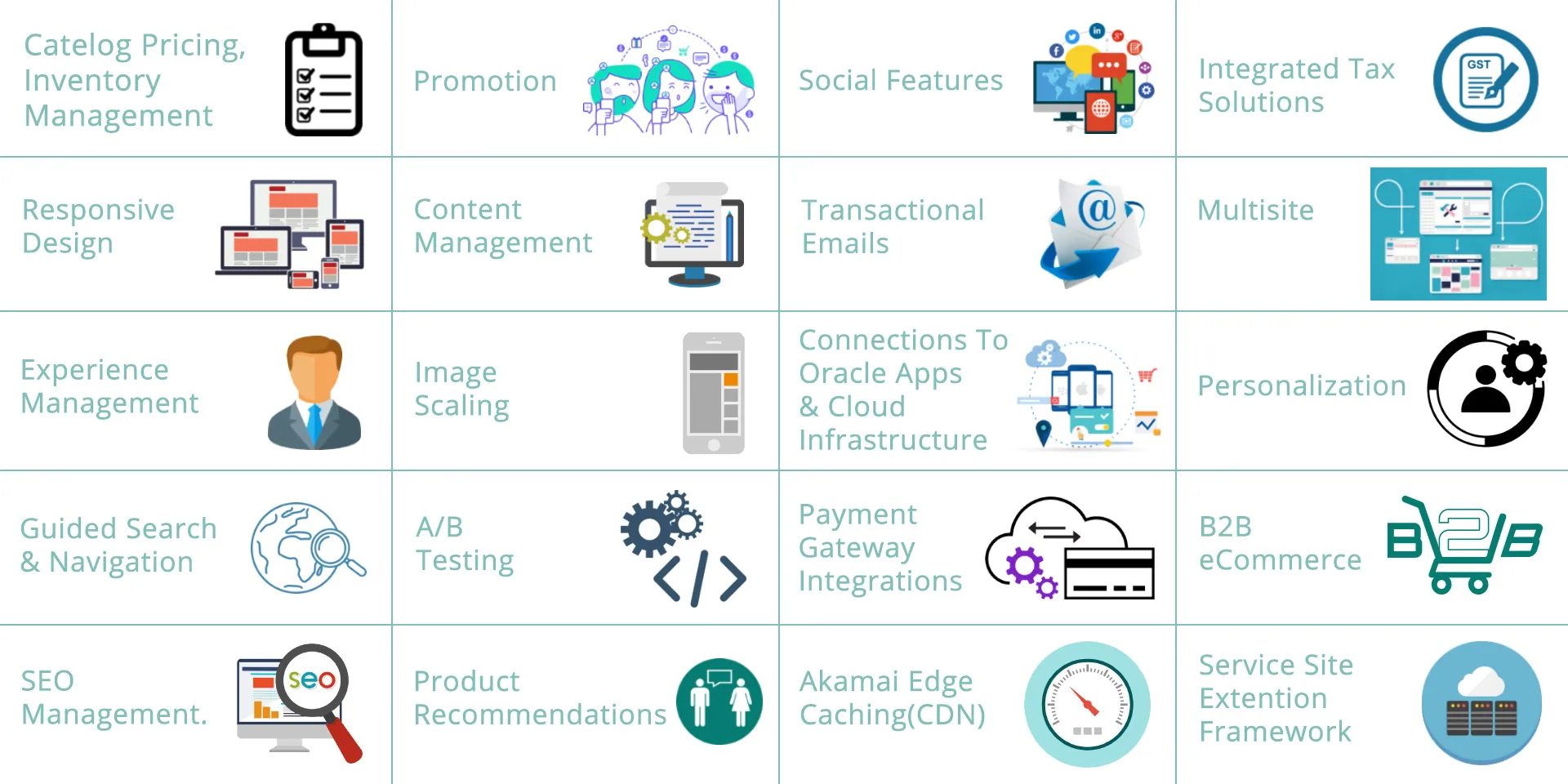
Next on our list is Oracle CX Commerce, a fully cloud-based enterprise commerce platform that integrates tightly with Oracle's Customer Experience (CX) suite. This solution stands out for combining eCommerce functionality with Oracle's strong CRM, ERP, and marketing systems for a complete customer lifecycle view.
Enterprise commerce features:
- Unified cloud-native architecture with SaaS agility
- Deep integration with Oracle ERP, CX, and Marketing Cloud
- Built-in B2B and B2C support in a single platform
- AI-powered product recommendations and personalization
- Visual merchandising and experience management tools
- Multi-site, multi-language, multi-currency capabilities
- Powerful REST APIs for headless commerce options
- Advanced customer segmentation and targeted promotions
- Commerce reporting and business intelligence dashboards
Oracle CX Commerce Custom pricing | Pros | Cons |
+ Seamless integration with the broader Oracle ecosystem + Strong support for mixed B2B and B2C business models + Robust data security and compliance at the enterprise level + Highly scalable for multinational commerce operations + Frequent feature updates through the SaaS model | + Complex platform requiring Oracle ecosystem familiarity + High licensing and implementation costs + Limited agility if heavy customization outside the Oracle suite is needed + Smaller third-party app ecosystem compared to Shopify or BigCommerce |
Best for:
Large multinational corporations already using Oracle ERP, CRM, and marketing tools, especially those managing both B2B and B2C channels from a centralized cloud system.
7. SAP Hybris Commerce (SAP Commerce Cloud)
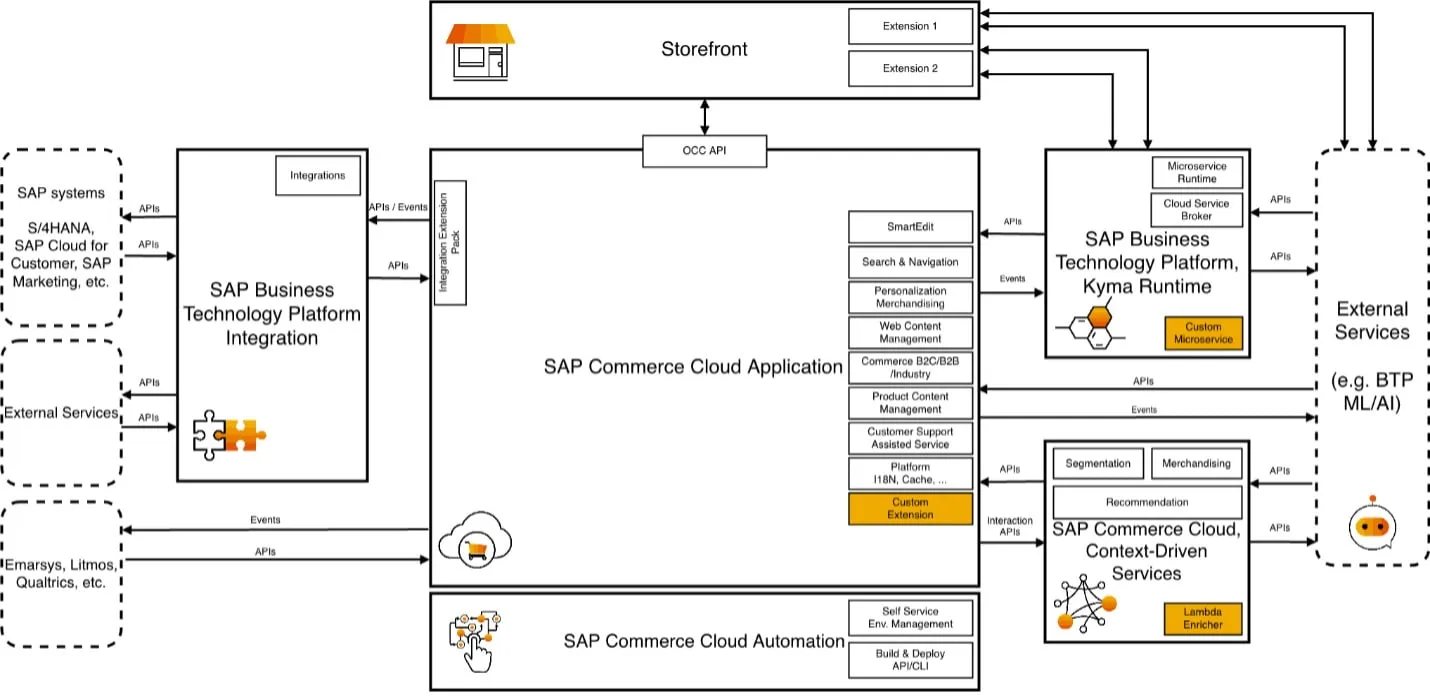
SAP Commerce Cloud (formerly SAP Hybris) is an enterprise-grade digital commerce platform that can handle extremely complex business models, particularly in B2B and B2B2C scenarios. Its strong integration with SAP's ERP and Customer Data platforms paves the way for solid support for highly customized, multi-national commerce ecosystems.
Enterprise commerce features:
- Industry-specific B2B/B2C/B2B2C accelerators
- Deep SAP ERP and SAP Customer Experience integration
- Advanced product information management (PIM) built-in
- SmartEdit for content and storefront management
- Omnichannel order management and customer service modules
- Extensive personalization and targeted promotions engine
- Powerful multi-catalog, multi-country, multi-brand management
- Cloud-native deployment with Kubernetes-based infrastructure
- AI-driven product recommendations via SAP Upscale Commerce
SAP Hybris Commerce Custom pricing | Pros | Cons |
+ Best-in-class for complex B2B, B2B2C, and industrial commerce + Highly customizable workflows and business logic + Strong backend scalability and reliability + Deep native integrations with SAP back-office systems + Rich support for multiple languages, currencies, and catalogs | + Very steep learning curve; highly technical implementation + Long time-to-market due to system complexity + Expensive licensing and integration costs + Heavy SAP ecosystem dependency |
Best for:
Large industrial manufacturers, distributors, and global brands with highly complex pricing, logistics, and customer management needs (particularly companies already invested in SAP ERP or SAP S/4HANA)
8. IBM WebSphere Commerce (now HCL Commerce)
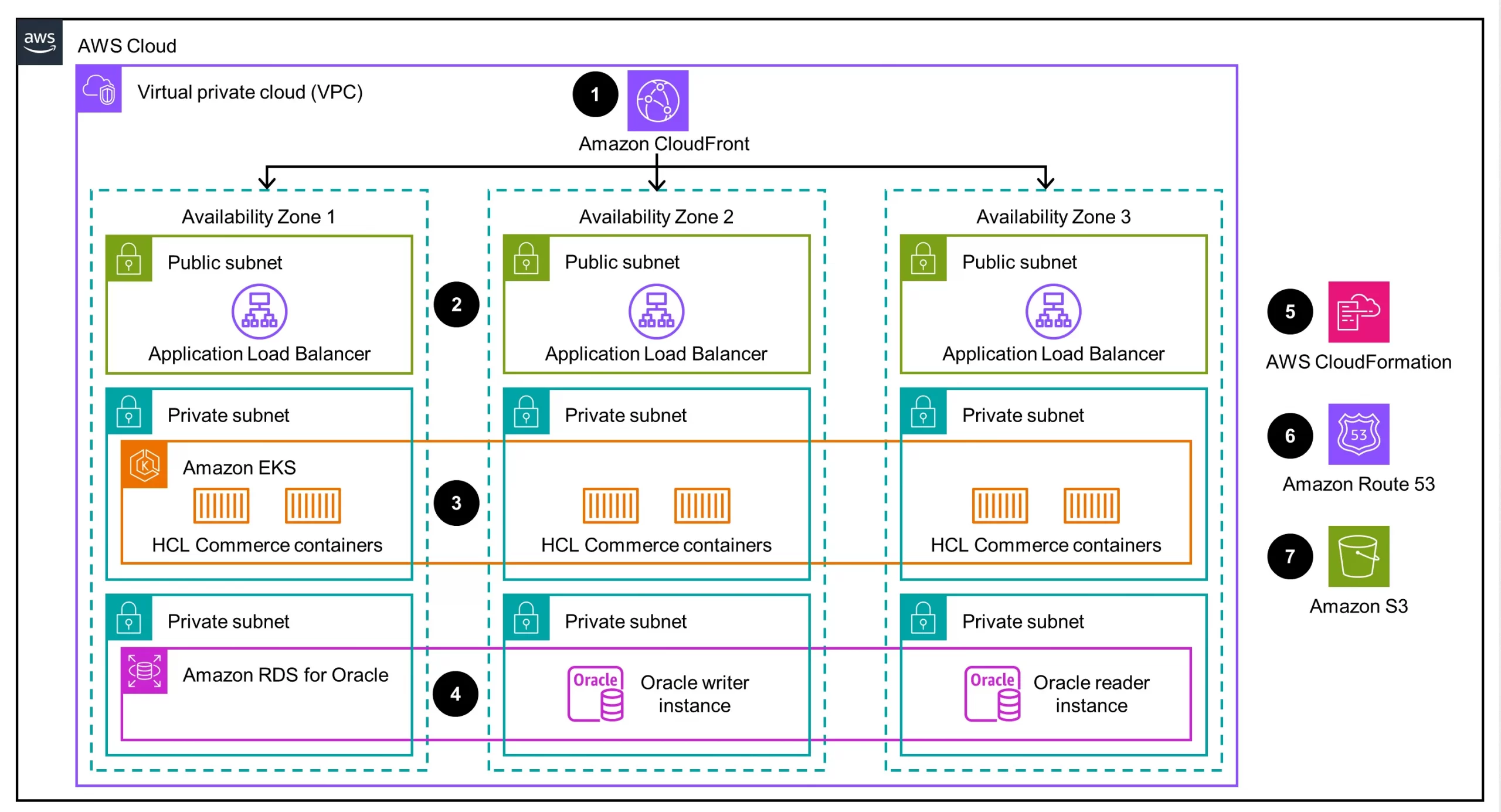
Formerly known as IBM WebSphere Commerce, now operated by HCL Technologies as HCL Commerce, this platform is built for enterprises needing highly customizable commerce infrastructures. It supports massive-scale operations and handles complex transactional models, particularly in B2B and multi-brand environments.
Enterprise commerce features:
- Highly flexible architecture for B2C, B2B, and B2B2C models
- Native support for multi-site, multi-brand, and multi-country stores
- Integrated customer segmentation, marketing, and promotions
- Enterprise-grade security and compliance
- REST APIs and GraphQL support for headless commerce
- Advanced search capabilities with AI-driven HCL Search
- Integration with IBM Cloud, AWS, or on-premise options
- Business user tooling for storefront customization without IT
HCL Commerce Custom pricing | Pros | Cons |
+ Extremely scalable for global operations + Very strong B2B support with complex contract pricing + Flexible hosting options (on-premise, cloud, hybrid) + Advanced AI-driven merchandising and search functionality + Powerful for managing multiple brands from a single backend | + Complex architecture requires skilled IT teams + Transition challenges for customers migrating from legacy IBM WebSphere setups + Slower time-to-market than pure SaaS competitors + Smaller new user community under HCL compared to the IBM branding era |
Best for:
Established enterprises with existing WebSphere deployments, companies needing heavy B2B functionality, or multi-brand giants requiring full ownership and control of infrastructure.
9. Sitecore Experience Cloud (with Sitecore OrderCloud)
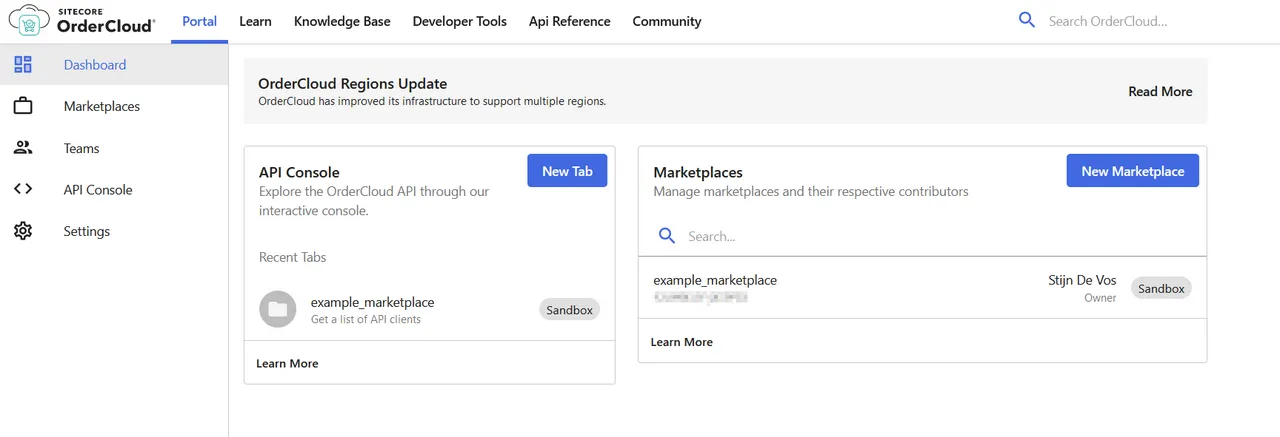
As one of the leading digital experience platforms (DXP), Sitecore Experience Cloud blends content management, personalization, and commerce through modular tools like Sitecore OrderCloud. It specifically focuses on delivering unified, personalized experiences across content and commerce, especially for highly tailored B2B or B2C journeys.
Enterprise commerce features:
- Deep personalization capabilities powered by Sitecore XP
- Sitecore OrderCloud for headless, API-first commerce
- Integrated content management and eCommerce workflows
- Support for complex B2B models: custom catalogs, buyer roles, workflows
- Multi-tenant, multi-brand, multi-region capabilities
- Event-driven architecture with webhooks and APIs
- Commerce analytics and customer behavior tracking
- Flexible deployment (SaaS, PaaS, or hybrid)
Sitecore Experience Cloud Custom pricing | Pros | Cons |
+ Best-in-class experience, personalization, and content-commerce fusion + Highly flexible headless architecture for custom experiences + Robust API-driven commerce capabilities + Strong modularity (build only what you need) + Tight content and commerce journey orchestration | + High initial investment for setup and integration + Requires significant technical expertise to fully leverage + Commerce component (OrderCloud) is newer compared to the core Sitecore CMS strength + Heavy integration and maintenance workload |
Best for:
Brands focused on delivering sophisticated, highly personalized digital experiences, particularly in B2B or luxury B2C, that need full control over both content and commerce experiences.
10. WooCommerce
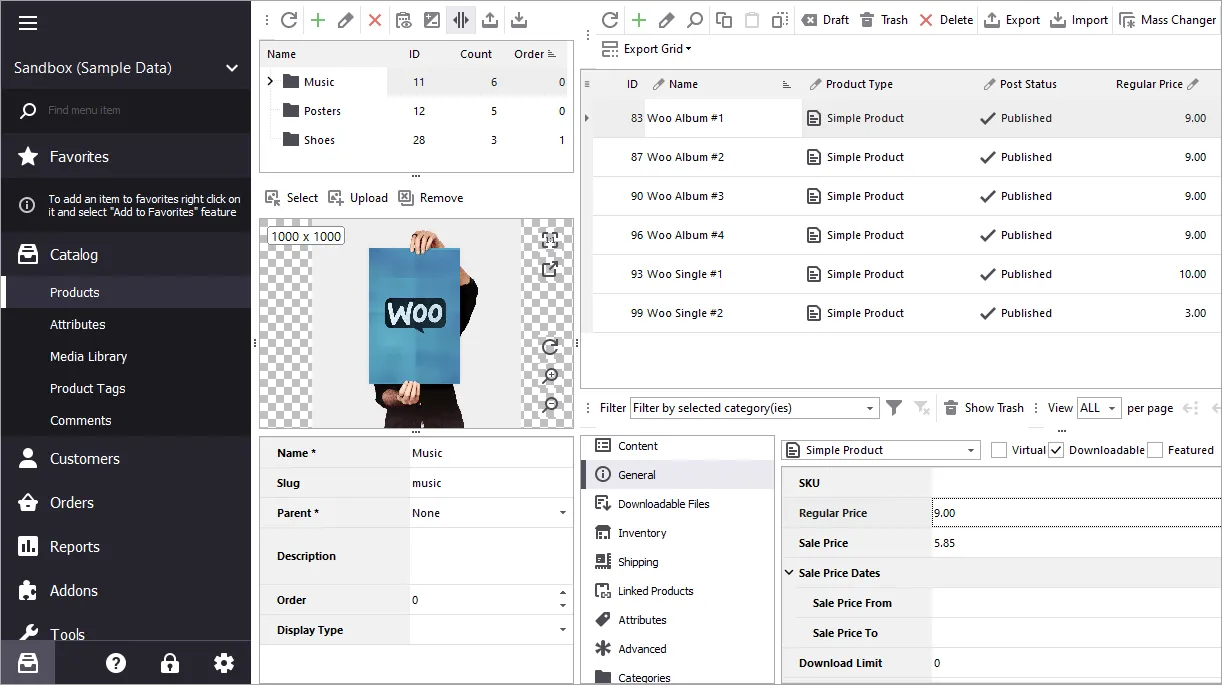
Most people typically recognize WooCommerce as a WordPress plugin for SMBs. Still, when combined with enterprise-grade hosting, scaling solutions, and custom development, it becomes a powerful option for mid-market to lower-enterprise businesses. WooCommerce stands out for offering full code ownership and unparalleled WordPress integration, which is ideal for content-heavy commerce operations.
Enterprise commerce features:
- Highly customizable open-source codebase
- Scalable hosting solutions with WooCommerce Enterprise partners (e.g., WordPress VIP)
- Large plugin and extension ecosystem
- Native multi-currency and multi-language via extensions
- B2B capabilities through plugins like Wholesale Suite
- REST API support for headless commerce
- Native blogging and SEO advantages via WordPress
- Flexible product types: physical, digital, subscriptions, bookings
WooCommerce Free to install | Pros | Cons |
+ Full platform ownership and customization control + Huge ecosystem of plugins, themes, and integrations + Seamless content-commerce blending with WordPress CMS + Cost-effective scaling compared to traditional enterprise platforms + Easy to find developers and service partners worldwide | + Not truly "enterprise-ready" without significant hosting and optimization investments + Requires extensive plugin management and quality control + Security and performance heavily dependent on setup quality + Complex high-volume order management can strain out-of-the-box setups |
Best for:
Content-driven brands, publishers, and mid-market businesses expanding into eCommerce that need flexibility and control without committing to high six-figure platform investments upfront.
Read more: WooCommerce review
How to Choose The Best Enterprise Commerce Platform
Instead of rushing into big brand names, take a step back and walk through the process carefully.
- Step 1. First, be crystal clear about your business model and what you really need. Are you mainly selling to consumers (B2C)? Other businesses (B2B)? Or maybe a mix of both (B2B2C)? Also. think about whether you'll need to manage multiple brands under one umbrella or sell globally in different currencies and languages.
- Step 2. Next, plan for where you want to be three to five years from now, since the platform you choose should grow with you. Once you've mapped out your growth path, consider all the systems your platform will need to work with. If your business already lives in an Oracle or SAP ecosystem, sticking within it (like Oracle CX Commerce or SAP Commerce Cloud) can save you tons of integration headaches.
- Step 3. Finally, decide whether you want a SaaS platform, an open-source platform, or a hybrid. SaaS platforms (like Shopify Plus and BigCommerce) handle hosting, updates, and security for you. Open-source platforms (like Adobe Commerce) give you total freedom to build exactly what you want, while hybrid models (like Salesforce Commerce Cloud or Sitecore) combine SaaS stability with some custom flexibility.
Enterprise Commerce: FAQs
What is an enterprise in commerce?
An enterprise in commerce refers to a large-scale organization engaging in commercial activities (selling goods, services, or digital products) across multiple markets or channels. In eCommerce terms, enterprises typically operate with complex structures: multiple brands, international operations, B2B and B2C divisions, and extensivve product catalogs.
What are the 4 types of eCommerce?
The four primary types of eCommerce are:
+ B2B (Business to Business): Companies selling products or services to other businesses (e.g., wholesalers, manufacturers).
+ B2C (Business to Consumer): Businesses selling directly to individual consumers (e.g., online retailers, brands like Nike.com).
+ C2C (Consumer to Consumer): Consumers selling directly to other consumers, usually through a marketplace platform (e.g., eBay, Etsy).
+ C2B (Consumer to Business): Individuals offering products or services to businesses (e.g., freelancers selling services on Fiverr).
What is eCommerce vs business?
eCommerce is a subset of business focused specifically on the online buying and selling of products and services through electronic channels, primarily websites and apps. Business, in the broader sense, encompasses all activities involved in producing, selling, managing, and delivering value, whether online or offline.
Conclusion
Each of the enterprise commerce solutions above, whether it's Shopify Plus, BigCommerce Enterprise, Adobe Commerce, or Salesforce Commerce Cloud, brings its own strengths and trade-offs. Make sure you take the time to review them carefully and validate your assumptions with the right questions!
For more expert tips on how to choose the best enterprise commerce platform, check out our blog and join our Facebook Community.

